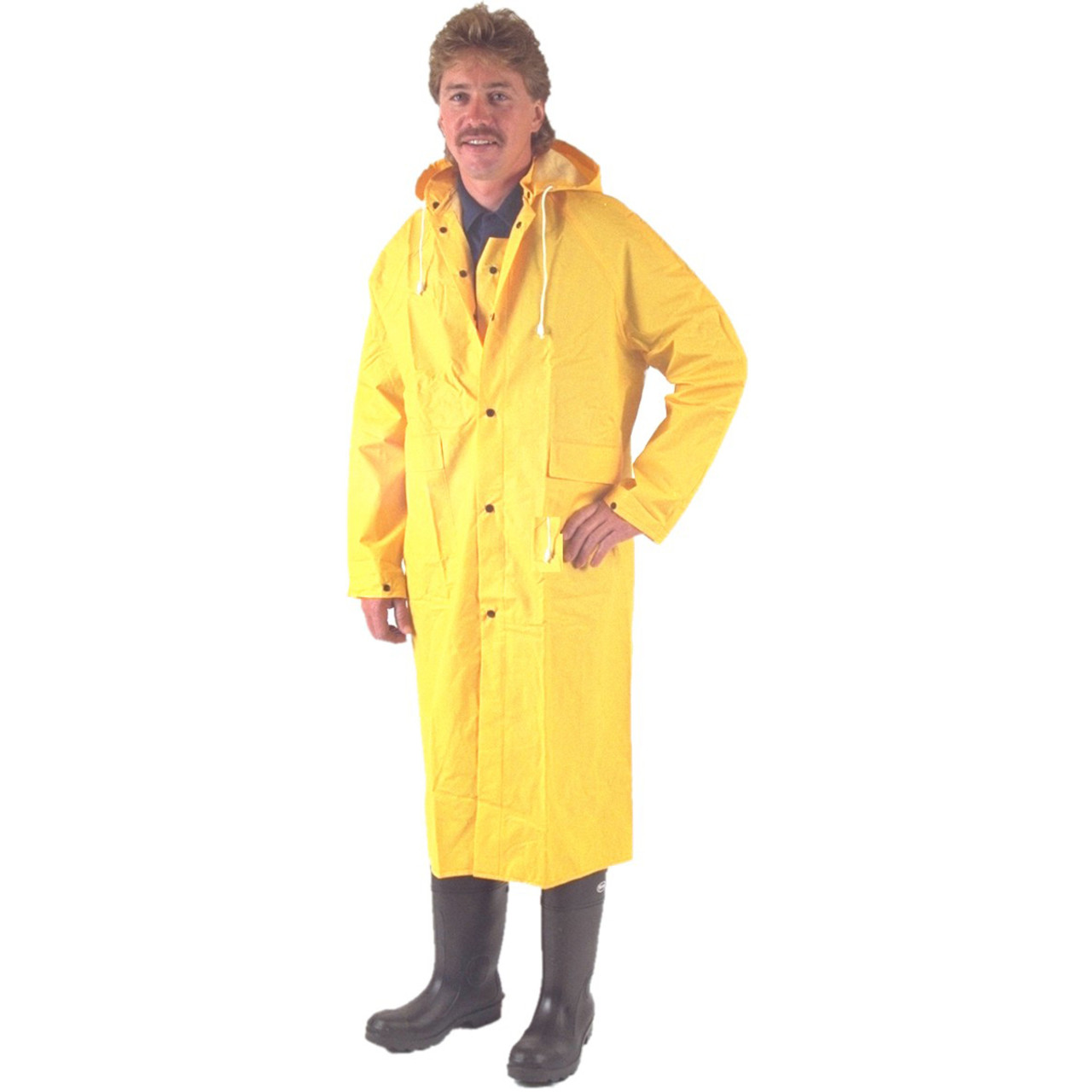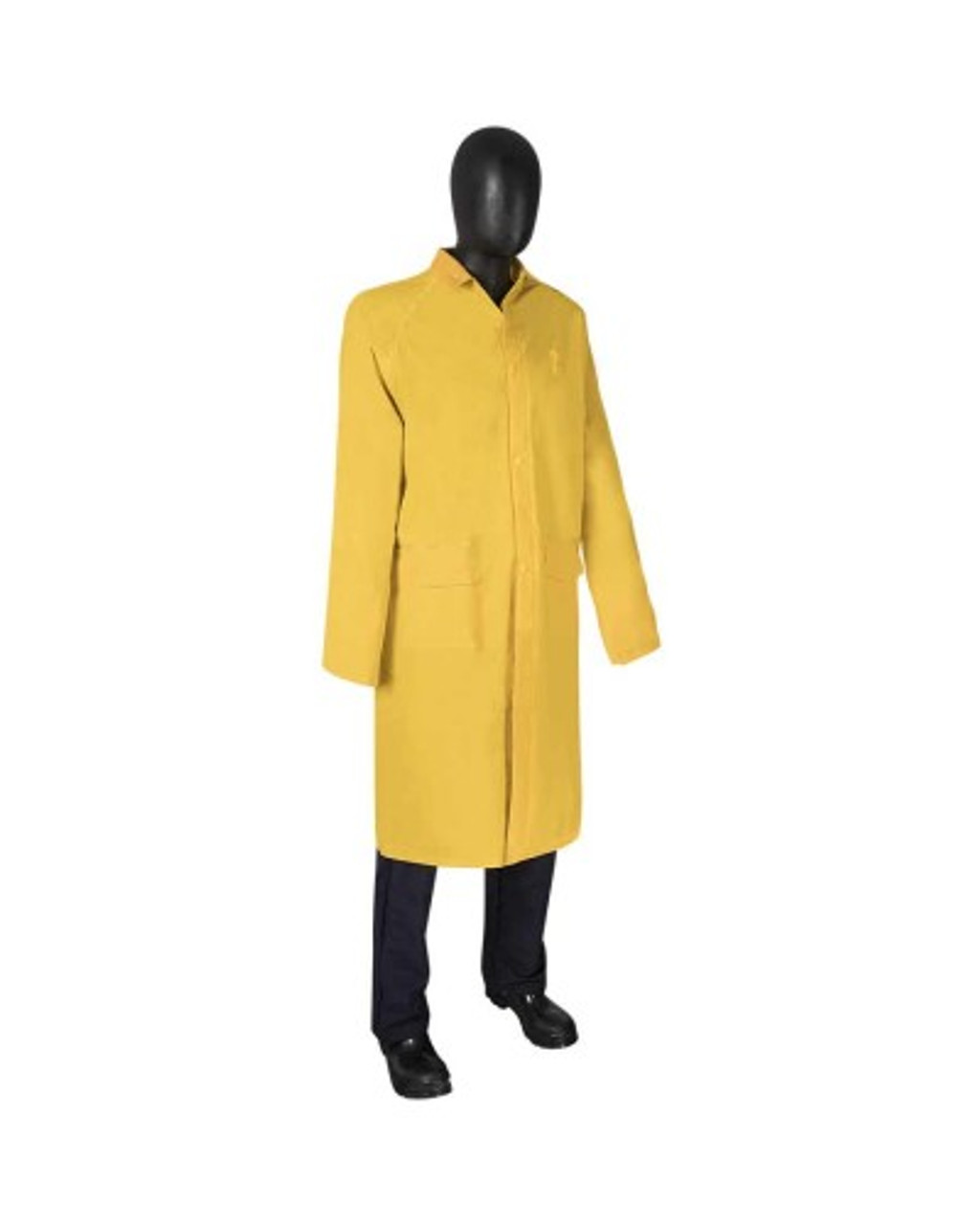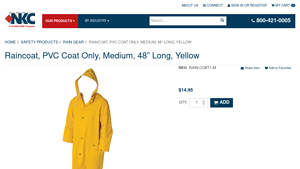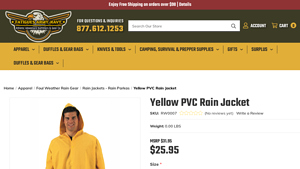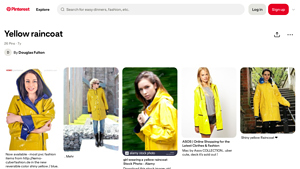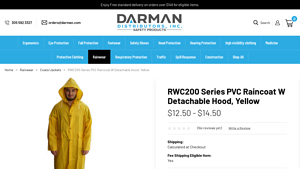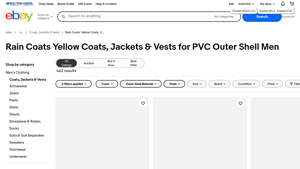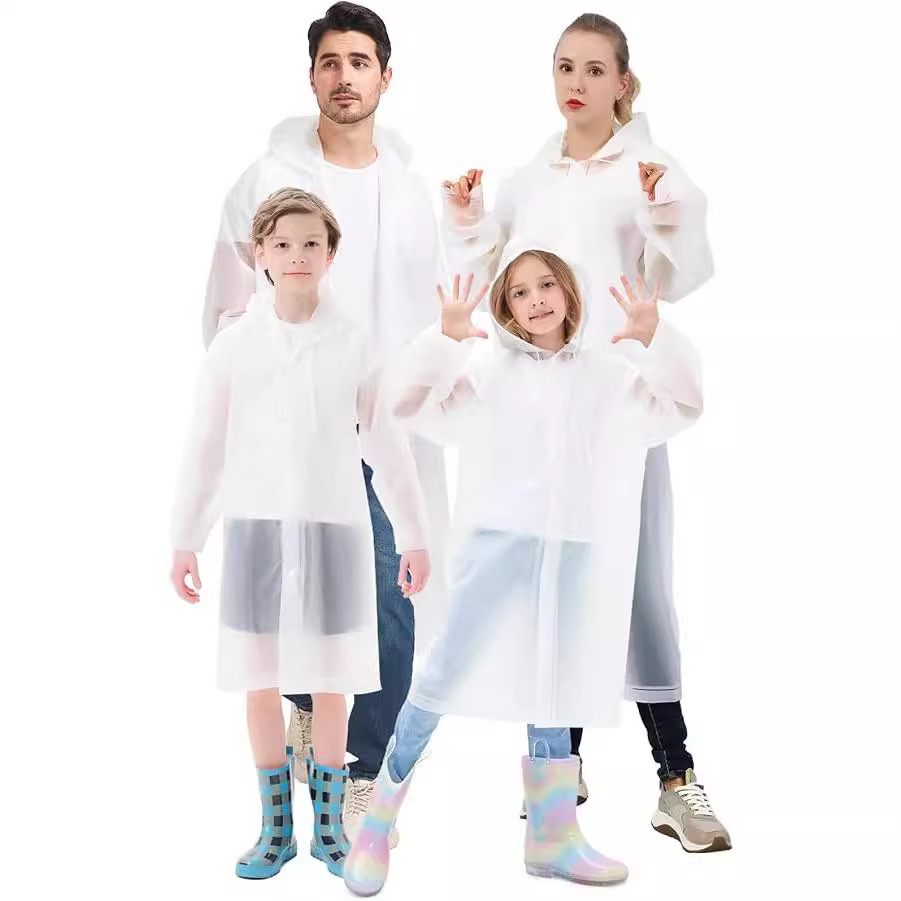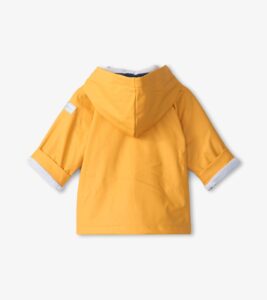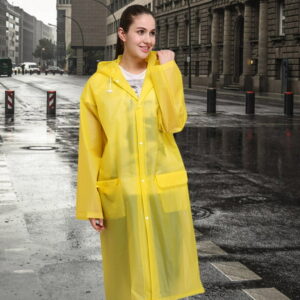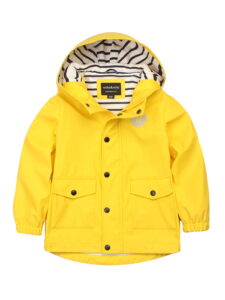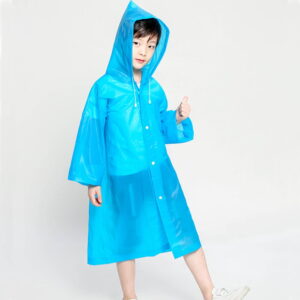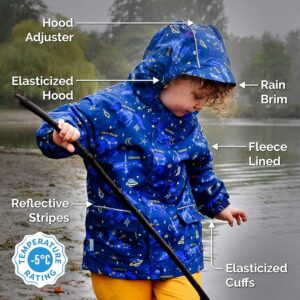Introduction: Navigating the Global Market for yellow pvc raincoat
In the ever-evolving landscape of global trade, sourcing high-quality yellow PVC raincoats presents unique challenges for international B2B buyers. Whether you are in Africa, South America, the Middle East, or Europe, understanding the diverse offerings in this niche market is crucial for making informed purchasing decisions. This guide is designed to be a comprehensive resource, addressing various types of yellow PVC raincoats, their applications across industries, and the critical factors for supplier vetting.
As weather patterns become increasingly unpredictable, the demand for durable and reliable rain gear has surged, making it essential for businesses to invest in quality products that ensure safety and comfort for their workforce. From heavy-duty raincoats for industrial applications to lighter options for retail markets, the variety available can be overwhelming. This guide will not only break down the specifications and benefits of different raincoat models but also provide insights into pricing strategies, market trends, and the regulatory considerations that vary by region.
By equipping B2B buyers with actionable insights and expert knowledge, this guide aims to empower businesses to navigate the complexities of sourcing yellow PVC raincoats effectively. With a focus on quality assurance and strategic procurement, you will be well-positioned to meet the demands of your market while ensuring compliance with international standards.
Article Navigation
- Top 5 Yellow Pvc Raincoat Manufacturers & Suppliers List
- Introduction: Navigating the Global Market for yellow pvc raincoat
- Understanding yellow pvc raincoat Types and Variations
- Key Industrial Applications of yellow pvc raincoat
- 3 Common User Pain Points for ‘yellow pvc raincoat’ & Their Solutions
- Strategic Material Selection Guide for yellow pvc raincoat
- In-depth Look: Manufacturing Processes and Quality Assurance for yellow pvc raincoat
- Practical Sourcing Guide: A Step-by-Step Checklist for ‘yellow pvc raincoat’
- Comprehensive Cost and Pricing Analysis for yellow pvc raincoat Sourcing
- Alternatives Analysis: Comparing yellow pvc raincoat With Other Solutions
- Essential Technical Properties and Trade Terminology for yellow pvc raincoat
- Navigating Market Dynamics and Sourcing Trends in the yellow pvc raincoat Sector
- Frequently Asked Questions (FAQs) for B2B Buyers of yellow pvc raincoat
- Important Disclaimer & Terms of Use
- Strategic Sourcing Conclusion and Outlook for yellow pvc raincoat
Understanding yellow pvc raincoat Types and Variations
| Type Name | Key Distinguishing Features | Primary B2B Applications | Brief Pros & Cons for Buyers |
|---|---|---|---|
| Heavy-Duty PVC Rain Jacket | Made from thick PVC, often includes a drawstring hood and pockets | Construction, outdoor work, emergency services | Pros: Durable, waterproof, and protective. Cons: Heavier and less breathable than lighter options. |
| PVC/Polyester Blend Raincoat | Combination of PVC and polyester for improved flexibility | Hospitality, food service, and industrial sectors | Pros: Lightweight, comfortable, and often more stylish. Cons: May not be as waterproof as pure PVC. |
| Reflective Yellow PVC Raincoat | Features reflective strips for visibility in low light conditions | Roadwork, public safety, and outdoor events | Pros: Enhanced safety, increased visibility. Cons: Reflective materials can wear off over time. |
| Security-Printed PVC Raincoat | Designed with security markings, often used by law enforcement | Security services, event management | Pros: Professional appearance, functional for security personnel. Cons: Limited to specific roles. |
| Packable Yellow PVC Rain Jacket | Lightweight and can be easily folded for storage | Travel, outdoor activities, and emergency kits | Pros: Portable and convenient. Cons: Less durable, may not withstand heavy rain. |
What are the Characteristics of Heavy-Duty PVC Rain Jackets?
Heavy-duty PVC rain jackets are designed for maximum durability and protection. They are typically constructed from thick PVC material, which makes them ideal for harsh weather conditions encountered in construction and emergency services. The inclusion of features like a drawstring hood and multiple pockets enhances functionality. B2B buyers should consider the weight and breathability of these jackets, as they may be bulkier compared to lighter alternatives.
How Do PVC/Polyester Blend Raincoats Differ?
PVC/polyester blend raincoats combine the waterproof properties of PVC with the flexibility and comfort of polyester. This variation is particularly suitable for industries like hospitality and food service, where comfort is crucial. Buyers should evaluate the balance between waterproofing and comfort, especially in environments where staff may be on their feet for extended periods.
Why Choose Reflective Yellow PVC Raincoats?
Reflective yellow PVC raincoats are specifically designed to enhance visibility, making them essential for roadwork and public safety applications. The reflective strips provide an added layer of safety in low-light conditions. While they offer significant benefits for visibility, B2B buyers should be aware that the reflective material can degrade over time, potentially reducing effectiveness.
What Are the Benefits of Security-Printed PVC Raincoats?
Security-printed PVC raincoats are tailored for professionals in the security sector, featuring markings that denote authority. These jackets are not only functional but also convey professionalism. When purchasing, businesses should consider the specific needs of their security personnel, including comfort and the appropriateness of the design for various environments.
How Do Packable Yellow PVC Rain Jackets Serve B2B Needs?
Packable yellow PVC rain jackets are lightweight and designed for convenience, making them ideal for travel and emergency kits. Their ability to fold into a compact size allows for easy storage and transport. However, buyers should weigh the trade-off between portability and durability, as these jackets may not withstand heavy rain as effectively as their heavier counterparts.
Key Industrial Applications of yellow pvc raincoat
| Industry/Sector | Specific Application of Yellow PVC Raincoat | Value/Benefit for the Business | Key Sourcing Considerations for this Application |
|---|---|---|---|
| Construction | Worker protection during outdoor projects | Ensures safety and comfort for workers in wet conditions | Durability, compliance with safety standards, and size range |
| Agriculture | Protection for farmworkers in adverse weather | Prevents exposure to rain, allowing uninterrupted work | Breathability, ease of movement, and agricultural compliance |
| Oil and Gas | Protective gear for personnel in drilling operations | Reduces risk of accidents and injuries in wet environments | Chemical resistance, waterproof features, and visibility |
| Public Safety | Uniforms for security and emergency responders | Enhances visibility and safety during adverse weather events | Customization options, durability, and comfort |
| Transportation & Logistics | Gear for drivers and warehouse staff | Protects employees from rain, ensuring operational efficiency | Lightweight design, waterproof capabilities, and bulk purchasing options |
How is the Yellow PVC Raincoat Used in the Construction Industry?
In the construction sector, yellow PVC raincoats are vital for protecting workers from rain and wet conditions. They are designed to be durable and provide a waterproof barrier, ensuring that workers remain dry and comfortable while on-site. This not only enhances safety but also helps maintain productivity during adverse weather. For international buyers, particularly those in Africa and South America, sourcing options should prioritize compliance with local safety regulations and the availability of various sizes to accommodate diverse workforces.
What Role Does the Yellow PVC Raincoat Play in Agriculture?
In agriculture, yellow PVC raincoats are essential for farmworkers who are often exposed to unpredictable weather. These raincoats help prevent workers from becoming soaked, which can lead to health issues and decreased productivity. Buyers in regions like the Middle East and Europe should consider the breathability and flexibility of the material, as these features allow for ease of movement while performing agricultural tasks. Additionally, ensuring compliance with agricultural safety standards is crucial when sourcing these products.
How is the Yellow PVC Raincoat Beneficial in the Oil and Gas Sector?
For the oil and gas industry, yellow PVC raincoats serve as protective gear for personnel working in drilling and extraction environments. These raincoats are designed to withstand harsh weather conditions while providing visibility in low-light situations. The waterproof nature of the material reduces the risk of slips and falls, which is critical in preventing accidents. International buyers, especially from Europe and regions with stringent safety regulations, should focus on sourcing raincoats that meet industry-specific standards for chemical resistance and visibility.
How is the Yellow PVC Raincoat Used by Public Safety Personnel?
Public safety professionals, including security personnel and emergency responders, utilize yellow PVC raincoats for visibility and protection during inclement weather. The bright color ensures that they are easily spotted, which is vital for their safety and effectiveness in emergency situations. When sourcing these raincoats, buyers must consider customization options, such as adding logos or text, as well as the durability of the fabric to withstand various weather conditions. This is particularly relevant for international buyers who may need to adhere to specific branding or uniform regulations.
What are the Applications of Yellow PVC Raincoats in Transportation and Logistics?
In the transportation and logistics industry, yellow PVC raincoats are used to protect drivers and warehouse staff from wet conditions. This protection is crucial for maintaining operational efficiency and ensuring that employees remain safe while performing their duties. Buyers should look for lightweight designs that offer waterproof capabilities without sacrificing mobility. Additionally, bulk purchasing options can be beneficial for companies looking to equip large teams, particularly in regions like Africa and South America where logistics operations are often challenged by weather conditions.
3 Common User Pain Points for ‘yellow pvc raincoat’ & Their Solutions
Scenario 1: Sourcing Quality Yellow PVC Raincoats for Diverse Climates
The Problem: B2B buyers, especially those operating in varied climates across Africa, South America, the Middle East, and Europe, face the challenge of sourcing yellow PVC raincoats that meet specific weather resilience criteria. Many suppliers may offer low-quality products that do not withstand heavy rain or extreme temperatures, leading to dissatisfaction among end-users. Furthermore, inconsistent sizing and material specifications can result in logistical challenges and increased return rates.
The Solution: To overcome this challenge, buyers should conduct thorough market research and establish relationships with manufacturers known for high-quality rainwear. When sourcing, look for certifications or reviews that validate the durability of the PVC material and the waterproofing capabilities of the raincoats. Specify your needs clearly, detailing the climatic conditions the raincoats must endure. Request samples to assess the fabric weight, stitching quality, and overall construction. By choosing suppliers that provide a robust warranty and return policy, you can mitigate the risk of poor-quality products affecting your inventory.
Scenario 2: Ensuring Compliance with Environmental Regulations
The Problem: Buyers in regions with stringent environmental regulations, such as California’s Proposition 65, may struggle to find yellow PVC raincoats that comply with these laws. Non-compliance can lead to severe penalties and damage to brand reputation. Additionally, some manufacturers may not disclose the presence of harmful chemicals, causing potential liability issues.
The Solution: To navigate these regulatory challenges, B2B buyers should prioritize sourcing from manufacturers who transparently disclose their compliance with environmental standards. Look for raincoats made from PVC that is certified as free from harmful chemicals, or consider alternative materials that meet the same waterproof standards but are more environmentally friendly. Engage with suppliers that provide documentation of compliance and invest in products that are both safe for consumers and compliant with local regulations. Additionally, consider forming partnerships with suppliers who can assist in developing eco-friendly alternatives, thereby enhancing your brand’s sustainability profile.
Scenario 3: Addressing Wear and Tear in High-Usage Environments
The Problem: B2B clients in sectors like construction, shipping, or outdoor services often require yellow PVC raincoats that can withstand heavy use. The constant exposure to harsh weather conditions can quickly lead to wear and tear, resulting in increased costs due to frequent replacements. Additionally, workers may feel uncomfortable in poorly designed raincoats, affecting their productivity.
The Solution: To address these concerns, buyers should focus on sourcing heavy-duty yellow PVC raincoats designed specifically for high-wear environments. Look for products that feature reinforced seams, adjustable cuffs, and ventilation options to enhance comfort and durability. Conduct a thorough assessment of the product’s lifecycle, evaluating its resistance to abrasions and ease of maintenance. Collaborate with suppliers who offer customization options, allowing you to brand the raincoats for your workforce. By investing in high-quality, ergonomically designed raincoats, you can significantly reduce replacement costs and improve worker satisfaction and efficiency.
Strategic Material Selection Guide for yellow pvc raincoat
What are the Key Materials Used in Yellow PVC Raincoats?
In the production of yellow PVC raincoats, several materials are commonly utilized, each with distinct properties and implications for performance, cost, and compliance. Understanding these materials is crucial for international B2B buyers looking to source high-quality rain gear tailored to their specific market needs.
What are the Key Properties of PVC in Raincoat Manufacturing?
PVC (Polyvinyl Chloride) is the primary material used in yellow raincoats due to its excellent waterproofing capabilities. It typically offers a temperature resistance ranging from -20°C to 60°C, making it suitable for various climates. PVC is also resistant to many chemicals and has a good tensile strength, ensuring durability under pressure.
Pros: PVC is cost-effective and easy to manufacture, allowing for mass production. Its waterproof nature makes it ideal for rain gear, and it can be easily colored, which is why yellow is a popular choice.
Cons: However, PVC can be less breathable than other materials, leading to discomfort during prolonged wear. Additionally, its environmental impact is a concern, especially in regions with strict regulations regarding PVC usage.
How Does Polyester Enhance the Performance of Raincoats?
Polyester is often blended with PVC to enhance the overall performance of raincoats. This combination improves the fabric’s strength and flexibility while maintaining waterproof properties. Polyester can withstand a wider temperature range and is generally more resistant to UV degradation compared to pure PVC.
Pros: The addition of polyester increases the durability and comfort of the raincoat, making it suitable for extended outdoor use. It also allows for better moisture management, reducing the risk of overheating.
Cons: The manufacturing process becomes slightly more complex when blending materials, potentially increasing costs. Additionally, polyester may not provide the same level of waterproofing as PVC alone, necessitating careful quality control.
What Role Does Rayon Play in Raincoat Construction?
Rayon is sometimes used in combination with PVC to create a softer and more comfortable raincoat. This material is known for its breathability, which can enhance user comfort in warmer climates.
Pros: Rayon adds a level of comfort and softness that can be appealing for everyday wear. It also helps in moisture absorption, making it a good choice for humid environments.
Cons: The downside is that rayon is less durable than PVC and may not withstand heavy rain or rough handling as effectively. This limitation could impact its suitability for industrial applications.
What Should International Buyers Consider When Sourcing Raincoats?
When sourcing yellow PVC raincoats, international buyers must consider compliance with local regulations and standards. For example, many countries have specific guidelines regarding the use of PVC due to environmental concerns. Buyers from Europe may need to adhere to REACH regulations, while those in the U.S. should be aware of Proposition 65.
Additionally, understanding local preferences for durability, comfort, and style can guide product selection. Regions like Africa and South America may prioritize affordability and functionality, while European markets might focus on sustainability and compliance with strict safety standards.
Summary Table of Material Properties for Yellow PVC Raincoats
| Material | Typical Use Case for yellow pvc raincoat | Key Advantage | Key Disadvantage/Limitation | Relative Cost (Low/Med/High) |
|---|---|---|---|---|
| PVC | Industrial and heavy-duty rain gear | Excellent waterproofing | Less breathable, environmental concerns | Low |
| Polyester | Blended raincoats for enhanced durability | Increased durability and comfort | More complex manufacturing process | Medium |
| Rayon | Everyday wear and comfort-focused designs | Softness and breathability | Less durable under heavy rain | Medium |
This strategic material selection guide provides essential insights for B2B buyers to make informed decisions when sourcing yellow PVC raincoats, ensuring that they meet the specific needs of their target markets while adhering to relevant regulations.
In-depth Look: Manufacturing Processes and Quality Assurance for yellow pvc raincoat
What Are the Key Stages in the Manufacturing Process of Yellow PVC Raincoats?
The manufacturing of yellow PVC raincoats involves several critical stages, each designed to ensure the final product meets quality and performance standards. Understanding these processes is essential for B2B buyers looking to source reliable rainwear.
Material Preparation: What Materials Are Used?
The primary material for yellow PVC raincoats is heavy-duty polyvinyl chloride (PVC), often blended with polyester to enhance durability and flexibility. Manufacturers typically begin by sourcing high-grade PVC sheets, which are evaluated for thickness, tensile strength, and waterproof capabilities. The preparation phase may also involve cutting the material into specific patterns that will form the raincoat. This step is crucial as it sets the foundation for the overall quality and fit of the finished product.
How Is the Forming Process Conducted?
Once the materials are prepared, the next stage is forming. This involves shaping the cut PVC pieces using techniques such as heat sealing and welding. Heat sealing is particularly common in the production of raincoats, as it ensures watertight seams that prevent leakage. The manufacturer may employ automated machines for precision, which enhances consistency in the dimensions and shapes of the raincoats.
What Does the Assembly Stage Entail?
After the forming process, assembly takes place, where various components of the raincoat are stitched or welded together. Key features such as hoods, pockets, and closures are integrated at this stage. Quality control is often integrated into the assembly line, where workers or automated systems check for defects in stitching and alignment. This step is critical as it impacts the overall functionality and appearance of the raincoat.
How Is the Finishing Process Completed?
The finishing stage involves adding final touches such as labeling, packaging, and sometimes additional waterproof treatments. Manufacturers may also conduct a visual inspection to ensure the product meets aesthetic standards. This stage often includes the application of reflective strips for safety, particularly for raincoats designed for industrial or emergency use. Proper finishing not only enhances the product’s appeal but also adds value in terms of safety and usability.
What Quality Assurance Measures Are Implemented in Raincoat Manufacturing?
Quality assurance (QA) is a vital aspect of the manufacturing process for yellow PVC raincoats, ensuring that products meet international and industry-specific standards. B2B buyers should understand these measures to ensure they are sourcing high-quality products.
Which International Standards Should B2B Buyers Be Aware Of?
One of the most recognized international standards is ISO 9001, which focuses on quality management systems. Compliance with this standard indicates that a manufacturer has established processes to ensure consistent quality throughout production. Additionally, certifications such as CE (Conformité Européenne) and API (American Petroleum Institute) are relevant, particularly for raincoats intended for specific industrial applications.
What Are the Key Quality Control Checkpoints?
Quality control (QC) involves several checkpoints throughout the manufacturing process. Key checkpoints include:
-
Incoming Quality Control (IQC): This stage involves inspecting raw materials upon arrival to ensure they meet specified standards before production begins.
-
In-Process Quality Control (IPQC): During manufacturing, IPQC checks are conducted to monitor the quality of work in progress. This includes checking the integrity of seams and the overall construction of the raincoat.
-
Final Quality Control (FQC): After assembly, FQC focuses on the finished products. This includes testing for waterproof capabilities, checking for defects, and ensuring that all specifications are met.
What Common Testing Methods Are Used for Quality Assurance?
Common testing methods for yellow PVC raincoats include:
-
Waterproof Testing: This is done using hydrostatic pressure tests to ensure the fabric can withstand water pressure without leaking.
-
Tensile Strength Testing: This evaluates the durability of the material, ensuring it can withstand stress without tearing.
-
Colorfastness Testing: This assesses how well the color holds up against washing and exposure to sunlight, which is vital for maintaining the product’s appearance over time.
How Can B2B Buyers Verify Supplier Quality Control Practices?
For international B2B buyers, particularly those from Africa, South America, the Middle East, and Europe, verifying a supplier’s quality control practices is essential.
What Steps Can Be Taken to Ensure Supplier Compliance?
-
Supplier Audits: Conducting regular audits of suppliers can provide insights into their manufacturing processes and quality control measures. An audit can assess compliance with international standards and identify areas for improvement.
-
Quality Assurance Reports: Requesting detailed QC reports can help buyers understand how the manufacturer monitors and maintains quality throughout production. These reports often include data on testing results and compliance with standards.
-
Third-Party Inspections: Engaging third-party inspection agencies can offer an unbiased evaluation of the manufacturing process and final products. This is particularly useful for large orders or new suppliers.
What Are the QC Nuances for International Buyers?
International buyers should be aware of specific regulations that may affect product compliance in their regions. For instance, certain countries may have unique environmental regulations that govern the use of PVC materials. Understanding these nuances is crucial for avoiding compliance issues and ensuring smooth importation processes.
In conclusion, the manufacturing processes and quality assurance measures for yellow PVC raincoats are multifaceted and critical for delivering high-quality products. B2B buyers should prioritize understanding these aspects to make informed sourcing decisions that align with their quality expectations and regulatory requirements.
Practical Sourcing Guide: A Step-by-Step Checklist for ‘yellow pvc raincoat’
Introduction
This guide serves as a comprehensive checklist for B2B buyers looking to procure yellow PVC raincoats. With various applications across sectors such as construction, agriculture, and public safety, it is essential to understand the specific requirements and considerations for sourcing these protective garments effectively. The following steps will help ensure that you select the right product and supplier for your business needs.
Step 1: Define Your Technical Specifications
Before initiating the sourcing process, clarify the technical specifications of the yellow PVC raincoat you require. This includes materials, weight, and features such as pockets, hoods, and waterproof ratings.
– Material Quality: Look for heavy-duty PVC or PVC-coated fabrics that provide durability.
– Size Range: Ensure that the supplier offers a comprehensive size range to accommodate all potential users.
Step 2: Identify Regulatory Compliance Needs
Different regions may have specific regulations governing the materials used in rainwear, particularly concerning PVC. Understanding these regulations is crucial to avoid compliance issues.
– Environmental Regulations: Check for compliance with laws like California’s Proposition 65 if you plan to sell in that state.
– Safety Standards: Ensure the raincoat meets safety standards relevant to your industry, such as EN343 for protective clothing against rain.
Step 3: Evaluate Potential Suppliers
Conduct thorough evaluations of potential suppliers to ascertain their reliability and quality standards. This step is vital for minimizing risks associated with sourcing.
– Request Documentation: Ask for company profiles, product certifications, and case studies.
– Customer References: Seek feedback from other businesses that have purchased from the supplier, particularly those in similar markets.
Step 4: Compare Pricing and Terms
Once you have a shortlist of suppliers, compare their pricing structures and terms of sale. This will help you identify the best value for your investment.
– Bulk Discounts: Inquire about discounts for larger orders, which can significantly impact your overall costs.
– Payment Terms: Understand the payment options available and any conditions tied to credit or bulk orders.
Step 5: Assess Customization Options
Depending on your branding needs, you might want to customize the raincoats with logos or specific features. Evaluate suppliers on their ability to provide these options.
– Branding Capabilities: Check if they offer screen printing or embroidery services for logos.
– Feature Customization: Discuss the possibility of modifying design elements to meet your specific requirements.
Step 6: Request Samples
Before finalizing your order, request samples to assess the quality and suitability of the raincoats. This step is crucial for ensuring that the product meets your expectations.
– Quality Assessment: Evaluate the material, stitching, and overall finish.
– Fit and Comfort: Ensure that the sizing aligns with your requirements and that the coat is comfortable for users.
Step 7: Establish a Clear Communication Channel
Effective communication is key to a successful sourcing process. Ensure that there is a clear line of communication with your supplier throughout the transaction.
– Point of Contact: Designate a specific contact person for your orders.
– Feedback Mechanism: Establish a process for providing feedback on product quality and service, which can help improve future transactions.
By following these steps, B2B buyers can confidently navigate the procurement process for yellow PVC raincoats, ensuring they meet their operational requirements while fostering strong supplier relationships.
Comprehensive Cost and Pricing Analysis for yellow pvc raincoat Sourcing
What Are the Key Cost Components in Sourcing Yellow PVC Raincoats?
When sourcing yellow PVC raincoats, B2B buyers must understand the critical cost components that contribute to the overall pricing structure. These components include:
-
Materials: The primary material used in yellow PVC raincoats is PVC (polyvinyl chloride), which is known for its waterproof properties. Higher quality PVC will typically command a higher price. Additionally, the inclusion of polyester or other fabric blends can also impact material costs.
-
Labor: Labor costs can vary significantly depending on the manufacturing location. For instance, labor in countries like Vietnam may be more affordable compared to Europe, affecting the final product price.
-
Manufacturing Overhead: This encompasses the costs associated with running the production facility, including utilities, equipment maintenance, and other indirect costs. Efficient manufacturing processes can help reduce these overheads.
-
Tooling: Custom tooling for specialized designs or features (like detachable hoods or reinforced seams) can add to the initial investment. However, for larger volume orders, the tooling costs can be amortized over a greater number of units, lowering the per-unit cost.
-
Quality Control (QC): Implementing stringent QC processes ensures that the raincoats meet international safety and quality standards. While this adds to costs, it is essential for maintaining brand reputation and customer satisfaction.
-
Logistics: Shipping costs play a vital role in the total cost structure. Factors such as distance, freight method, and Incoterms can significantly influence logistics expenses.
-
Margin: Suppliers will typically add a margin to cover their costs and ensure profitability. This margin can vary based on market conditions and competition.
How Do Price Influencers Affect the Cost of Yellow PVC Raincoats?
Several factors influence the pricing of yellow PVC raincoats in the B2B market:
-
Volume/MOQ (Minimum Order Quantity): Higher order volumes often lead to reduced unit prices due to economies of scale. Suppliers are more willing to negotiate better pricing for bulk orders.
-
Specifications and Customization: Customized raincoats (such as those with specific branding or additional features) may incur higher costs. Buyers should weigh the benefits of customization against the increased price.
-
Material Quality and Certifications: Raincoats that meet specific safety and environmental certifications may be priced higher due to the added compliance costs. Buyers should consider whether these certifications are necessary for their target market.
-
Supplier Factors: The reputation and reliability of suppliers can impact pricing. Established suppliers with a history of quality assurance may charge a premium, while newer entrants may offer lower prices to gain market share.
-
Incoterms: The choice of Incoterms affects the distribution of costs and responsibilities between buyer and seller. Understanding these terms can help buyers manage their total cost more effectively.
What Are the Best Negotiation Strategies for International B2B Buyers?
For international buyers, particularly from Africa, South America, the Middle East, and Europe, effective negotiation is crucial for achieving favorable pricing. Here are some strategies:
-
Leverage Total Cost of Ownership (TCO): Consider not just the purchase price but also long-term costs such as shipping, tariffs, and maintenance. This holistic view can provide leverage in negotiations.
-
Build Relationships with Suppliers: Establishing strong relationships can lead to better pricing and terms. Trust and reliability can often outweigh mere price competition.
-
Request Multiple Quotes: Engaging multiple suppliers can provide a competitive landscape, giving buyers leverage in negotiations. It also helps in understanding the market rate for specific products.
-
Be Aware of Pricing Nuances: Understand the local market dynamics, such as currency fluctuations and economic conditions, which can affect pricing. Buyers should also be aware of seasonal variations in demand that may impact costs.
-
Negotiate Payment Terms: Flexible payment terms can improve cash flow. Consider negotiating for extended payment periods or discounts for early payments to enhance the overall deal.
Conclusion
Understanding the cost structure and pricing dynamics of yellow PVC raincoats is essential for B2B buyers aiming to make informed sourcing decisions. By recognizing the key cost components and price influencers, and employing effective negotiation strategies, buyers can optimize their procurement processes and secure favorable terms. Always remember that indicative prices may vary, and thorough research is crucial for achieving the best possible outcomes in international sourcing.
Alternatives Analysis: Comparing yellow pvc raincoat With Other Solutions
When evaluating protective outerwear options for wet conditions, businesses often consider various alternatives to the yellow PVC raincoat. Understanding these alternatives can help B2B buyers make informed decisions based on performance, cost, and specific use cases. Below, we compare the yellow PVC raincoat against two viable alternatives: the polyester raincoat and the breathable waterproof jacket.
| Comparison Aspect | Yellow PVC Raincoat | Polyester Raincoat | Breathable Waterproof Jacket |
|---|---|---|---|
| Performance | Excellent waterproofing; durable and resistant to chemicals. | Good waterproofing; less durable under extreme conditions. | Moderate waterproofing; designed for breathability, not full immersion. |
| Cost | Generally lower cost; around $25-$40. | Mid-range; typically $30-$70. | Higher cost; often $80-$150. |
| Ease of Implementation | Simple design; easy to put on and take off. | Similar ease of use; may require care for longevity. | Slightly more complex; may have additional features that need understanding. |
| Maintenance | Low maintenance; wipe clean or machine wash. | Moderate maintenance; requires careful washing to maintain waterproofing. | Higher maintenance; requires special cleaning products to preserve breathability. |
| Best Use Case | Ideal for heavy-duty work environments, outdoor activities in rain. | Suitable for casual wear and moderate outdoor activities. | Best for active users needing ventilation, such as hikers or cyclists. |
What Are the Pros and Cons of Polyester Raincoats?
Polyester raincoats offer a balance between cost and functionality. They generally provide good waterproofing and are lightweight, making them suitable for casual wear and moderate outdoor activities. However, their performance may falter in extreme weather, and they typically require more maintenance than PVC raincoats to ensure their waterproofing lasts. Additionally, they may not resist chemicals as effectively as PVC options, making them less ideal for industrial settings.
How Do Breathable Waterproof Jackets Compare?
Breathable waterproof jackets are designed for active users who require ventilation alongside waterproof capabilities. These jackets often feature advanced materials that allow moisture to escape while keeping rain out, making them perfect for hiking or cycling. However, they come with a higher price tag and may not provide the same level of waterproofing as PVC raincoats. Maintenance is also more demanding, as improper cleaning can compromise their breathability, which is a critical aspect for active users.
How Should B2B Buyers Choose the Right Solution?
When deciding between a yellow PVC raincoat and its alternatives, B2B buyers should consider the specific needs of their workforce or clientele. For industries such as construction or heavy manufacturing, where exposure to rain and chemicals is frequent, the yellow PVC raincoat may be the most suitable choice due to its durability and cost-effectiveness. Conversely, for outdoor retail or recreational businesses, breathable waterproof jackets may offer the best balance of comfort and functionality. Ultimately, the decision should be based on performance requirements, cost considerations, and the operational environment in which the product will be used.
Essential Technical Properties and Trade Terminology for yellow pvc raincoat
What Are the Essential Technical Properties of a Yellow PVC Raincoat?
Understanding the technical properties of yellow PVC raincoats is crucial for B2B buyers to ensure that the products meet specific operational needs and compliance standards. Here are some key specifications to consider:
-
Material Grade
The primary material used in yellow PVC raincoats is polyvinyl chloride (PVC), often combined with polyester for added durability. The material grade can significantly impact the raincoat’s waterproofing capabilities, resistance to wear and tear, and overall longevity. Higher-grade PVC (e.g., 0.35 mm thickness) provides better protection against harsh weather conditions, making it suitable for industrial applications. -
Waterproof Rating
This rating indicates the level of water resistance the raincoat offers. A higher waterproof rating (usually measured in millimeters) means better protection against rain. For instance, a raincoat with a rating of 10,000 mm can withstand heavy rainfall, making it ideal for outdoor workers in regions with frequent downpours. This specification is vital for B2B buyers in construction, agriculture, and outdoor event management. -
Size Range and Fit
Yellow PVC raincoats come in various sizes, typically from Small to 3X-Large. A well-defined size range ensures that the raincoat fits comfortably over other work attire, which is essential for mobility and functionality. Buyers should consider the demographic of their workforce to ensure adequate stock levels of each size, preventing wastage and ensuring employee safety. -
Features and Functionalities
Essential features include adjustable hoods, snap closures, and cargo pockets. The inclusion of ventilation (e.g., underarm vents) can enhance comfort during extended wear. Understanding these features helps buyers select raincoats that not only provide protection but also enhance user comfort and functionality, which can lead to higher employee satisfaction and productivity. -
Compliance Standards
Raincoats may need to adhere to specific regional regulations, such as California’s Proposition 65, which restricts certain materials. Buyers must ensure that their suppliers comply with local laws to avoid legal complications. This is particularly important for international buyers who may face different regulatory environments.
What Are Common Trade Terms Related to Yellow PVC Raincoats?
Familiarity with trade terminology is essential for effective communication and negotiation in B2B transactions. Here are several key terms relevant to yellow PVC raincoats:
-
OEM (Original Equipment Manufacturer)
This term refers to companies that produce parts or equipment that may be marketed by another manufacturer. In the context of raincoats, an OEM might create customized rainwear for a specific brand, ensuring that the product meets unique specifications and branding requirements. -
MOQ (Minimum Order Quantity)
MOQ is the smallest quantity of a product that a supplier is willing to sell. Understanding MOQ helps buyers plan their purchases effectively, as ordering below this threshold may lead to higher costs or unavailability. It’s critical for budget management and inventory planning. -
RFQ (Request for Quotation)
An RFQ is a document used to solicit price quotes from suppliers. This is particularly useful when buyers are looking to compare costs among multiple manufacturers. A well-prepared RFQ can streamline the procurement process and ensure competitive pricing. -
Incoterms (International Commercial Terms)
These are predefined commercial terms published by the International Chamber of Commerce that outline the responsibilities of buyers and sellers in international transactions. Understanding Incoterms is essential for managing shipping costs, insurance, and liability, particularly when sourcing from international suppliers. -
Lead Time
Lead time refers to the time taken from placing an order to the delivery of the product. It is crucial for planning and inventory management. Buyers should consider lead times when placing orders, especially if they require the raincoats for specific seasons or projects.
By understanding these technical properties and trade terms, B2B buyers can make informed decisions that align with their operational needs and compliance requirements, ensuring a successful procurement process.
Navigating Market Dynamics and Sourcing Trends in the yellow pvc raincoat Sector
What Are the Current Market Dynamics and Key Trends in the Yellow PVC Raincoat Sector?
The global market for yellow PVC raincoats is influenced by several key drivers, including increased demand for protective clothing across various industries, rising awareness of safety regulations, and unpredictable weather patterns. The construction, agriculture, and outdoor recreation sectors are notable contributors to this demand, particularly in regions with frequent rainfall. Emerging markets in Africa and South America are witnessing a surge in infrastructure projects, thus boosting the need for durable rain gear.
Technological advancements in manufacturing processes are also shaping the market, with innovations such as enhanced waterproofing techniques and the introduction of lightweight yet durable materials. These improvements not only increase product lifespan but also enhance comfort for users, making raincoats more appealing for everyday wear. Moreover, the rise of e-commerce platforms has facilitated easier access for international B2B buyers, allowing them to source products from manufacturers across the globe, including those in Europe and Asia.
As buyers look to optimize their supply chains, trends such as bulk purchasing and direct sourcing from manufacturers are gaining traction. This approach not only reduces costs but also fosters stronger relationships with suppliers, enabling better negotiation terms and customized product offerings.
How Is Sustainability Influencing Sourcing Practices in the Yellow PVC Raincoat Market?
Sustainability is becoming a pivotal factor in the procurement of yellow PVC raincoats. The environmental impact of PVC production is significant, with concerns regarding its lifecycle and disposal. Consequently, buyers are increasingly prioritizing ethical sourcing practices and looking for suppliers who demonstrate commitment to sustainability.
In response, manufacturers are exploring alternative materials that offer similar performance characteristics while minimizing environmental harm. For instance, some companies are adopting biodegradable or recycled materials to produce rain gear, reflecting a shift towards greener practices. Certifications such as OEKO-TEX and Global Recycled Standard are becoming essential for B2B buyers, as they ensure products meet specific environmental and safety criteria.
Moreover, transparency in the supply chain is gaining importance. Buyers are encouraged to engage with suppliers who provide detailed information about their sourcing practices, labor conditions, and environmental impact. This not only aligns with corporate social responsibility goals but also appeals to a growing consumer base that values sustainability.
What Is the Historical Context of Yellow PVC Raincoats in B2B Sourcing?
The evolution of yellow PVC raincoats can be traced back to the early 20th century when they were primarily used for industrial and maritime applications due to their waterproof properties. As labor laws and safety regulations began to evolve, the demand for protective clothing surged, leading to innovations in design and material.
Over the decades, yellow PVC raincoats transitioned from purely functional gear to items that blend utility with fashion, particularly in sectors like outdoor recreation and personal use. Today, they are recognized not only for their protective qualities but also for their visibility, making them a staple in safety gear for various professions. As the market continues to grow, understanding this historical context allows B2B buyers to appreciate the product’s evolution and its relevance in contemporary sourcing strategies.
In summary, navigating the yellow PVC raincoat sector requires a keen understanding of market dynamics, a commitment to sustainability, and an appreciation for the historical context that shapes current trends. By aligning sourcing strategies with these insights, international B2B buyers can optimize their procurement processes while fostering ethical and environmentally responsible practices.
Frequently Asked Questions (FAQs) for B2B Buyers of yellow pvc raincoat
-
How do I select the right yellow PVC raincoat for my business needs?
Choosing the right yellow PVC raincoat involves assessing your specific requirements, such as the intended use (e.g., industrial work, outdoor events, or emergency services). Consider factors like material thickness, waterproofing capabilities, and additional features such as hoods, pockets, and reflective elements. It’s also important to evaluate sizing options to ensure a good fit for your workforce. Supplier catalogs often provide detailed specifications and customer reviews, which can guide your decision-making process. -
What are the typical minimum order quantities (MOQs) for yellow PVC raincoats?
Minimum order quantities for yellow PVC raincoats can vary significantly depending on the supplier and the customization options selected. Generally, MOQs range from 50 to 500 units for bulk orders. When negotiating with suppliers, inquire about their MOQ policies, as some may offer flexibility for first-time orders or if you are considering a long-term partnership. Understanding these quantities helps in budgeting and inventory planning. -
What customization options are available for yellow PVC raincoats?
Customization options for yellow PVC raincoats often include logo printing, size variations, and color choices. Some manufacturers may also offer bespoke features like pockets, reflective strips, or additional lining for insulation. Discuss your specific requirements with potential suppliers to explore their capabilities. Customization can enhance brand visibility and ensure that the raincoats meet the unique needs of your employees or clients. -
What payment terms are commonly accepted by suppliers of yellow PVC raincoats?
Payment terms can vary widely among suppliers, but common practices include net 30, 60, or 90 days payment terms following delivery. Some suppliers may require a deposit upfront, especially for large orders or customizations. It’s crucial to clarify payment methods accepted (e.g., bank transfers, credit cards, or letters of credit) and ensure that the terms are documented in your purchase agreement to avoid any misunderstandings. -
How do I vet suppliers for yellow PVC raincoats effectively?
Vetting suppliers involves researching their reputation, production capabilities, and compliance with international quality standards. Check for certifications like ISO or industry-specific approvals. Request samples to assess product quality and examine customer feedback or reviews. Engaging with past clients can provide insights into their reliability and service. Establishing a clear communication channel can also facilitate better collaboration. -
What quality assurance measures should I expect from suppliers?
Reputable suppliers should implement stringent quality assurance measures, including regular inspections during production and final quality checks before shipping. They may also provide documentation of compliance with safety and environmental regulations. It’s advisable to request information on their quality control processes and certifications. Establishing clear expectations for quality can help prevent issues post-delivery. -
What logistics considerations should I keep in mind when sourcing yellow PVC raincoats?
Logistics play a crucial role in the timely delivery of your raincoat orders. Consider shipping options, lead times, and costs associated with international freight. Ensure that the supplier can manage customs documentation and compliance with regulations in your region. Discuss potential warehousing options if you anticipate large shipments or fluctuating demand. Coordinating closely with your supplier will facilitate smoother logistics. -
How do I handle returns or defects in my order of yellow PVC raincoats?
Establish a clear returns policy with your supplier prior to placing an order. This should outline the process for handling defective items, including timeframes for reporting issues and any conditions for returns. Most reputable suppliers will have a straightforward return process to address defects or unsatisfactory products. Ensure that you document any defects with photos and detailed descriptions to expedite the resolution process.
Important Disclaimer & Terms of Use
⚠️ Important Disclaimer
The information provided in this guide, including content regarding manufacturers, technical specifications, and market analysis, is for informational and educational purposes only. It does not constitute professional procurement advice, financial advice, or legal advice.
While we have made every effort to ensure the accuracy and timeliness of the information, we are not responsible for any errors, omissions, or outdated information. Market conditions, company details, and technical standards are subject to change.
B2B buyers must conduct their own independent and thorough due diligence before making any purchasing decisions. This includes contacting suppliers directly, verifying certifications, requesting samples, and seeking professional consultation. The risk of relying on any information in this guide is borne solely by the reader.
Top 5 Yellow Pvc Raincoat Manufacturers & Suppliers List
1. NKC – Medium PVC Raincoat
2. Fatigues Army Navy – Yellow PVC Rain Jacket
3. Kemo Cyberfashion – Reversible PVC Fashion Items
Domain: pinterest.com
Registered: 2009 (16 years)
Introduction: Now available – most pvc fashion items from http://kemo-cyberfashion.de in the new reversible color shiny yellow / blue. The material is 400 microns thick but very soft and has a nice smell.
4. Darman – RWC200 Series PVC Raincoat
Domain: darman.com
Registered: 1996 (29 years)
Introduction: RWC200 Series PVC Raincoat with Detachable Hood, Yellow; MSRP: $12.50 – $14.50; No reviews yet.
5. West Chester – 3-Piece X Large Yellow Rain Suit
Domain: ebay.com
Registered: 1995 (30 years)
Introduction: Rain Coats Yellow Coats, Jackets & Vests for PVC Outer Shell Men for sale on eBay. Popular items include 3-piece X Large Yellow Rain Suits, West Chester Model 44035 for $21.00, CLC R101l Climate Gear 3 Piece Yellow Rain Suit Large for $19.99, and CLC R101m 3-piece Rain Suit Yellow Medium for $28.52. Related searches include Yellow Raincoat Men, PVC Rain Jacket, and Raincoat PVC Polyurethane.
Strategic Sourcing Conclusion and Outlook for yellow pvc raincoat
In today’s competitive market, the strategic sourcing of yellow PVC raincoats presents significant opportunities for international B2B buyers. These raincoats, known for their durability and waterproof qualities, cater to various sectors, including construction, agriculture, and emergency services, making them indispensable in regions prone to inclement weather. By focusing on quality materials, such as heavy-duty PVC and polyester blends, businesses can ensure that they meet the demands of their end-users while also adhering to safety and environmental regulations.
The value of strategic sourcing lies not only in cost reduction but also in building strong supplier relationships and ensuring consistent product quality. Buyers from Africa, South America, the Middle East, and Europe should leverage local supplier networks to optimize their sourcing strategies, considering both price and product specifications to meet diverse market needs.
Looking ahead, as global weather patterns become increasingly unpredictable, the demand for high-quality rain gear will likely rise. B2B buyers are encouraged to act now—evaluate your sourcing strategies, explore new supplier partnerships, and invest in innovative product offerings. The future of yellow PVC raincoats is promising, and aligning with the right suppliers will position your business for success in this evolving landscape.

